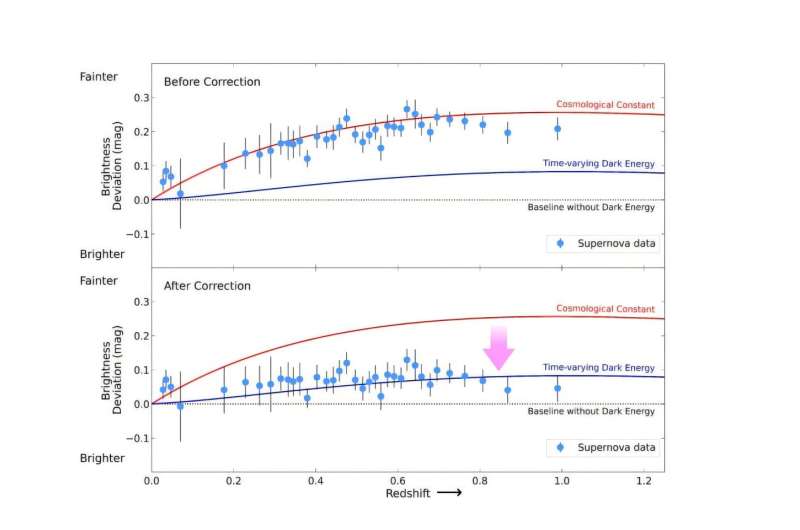The universe’s expansion may actually have started to slow rather than accelerating at an ever-increasing rate as previously thought, a new study suggests.
“Remarkable” findings published today in Monthly Notices of the Royal Astronomical Society cast doubt on the long-standing theory that a mysterious force known as ‘dark energy’ is driving distant galaxies away increasingly faster.
Instead, they show no evidence of an accelerating universe.
If the results are confirmed, it could open an entirely new chapter in scientists’ quest to uncover the true nature of dark energy, resolve the ‘Hubble tension,’ and understand the past and future of the universe.
Lead researcher Professor Young-Wook Lee, of Yonsei University in South Korea, said, “Our study shows that the universe has already entered a phase of decelerated expansion at the present epoch and that dark energy evolves with time much more rapidly than previously thought.
“If these results are confirmed, it would mark a major paradigm shift in cosmology since the discovery of dark energy 27 years ago.”
For the past three decades, astronomers have widely believed that the universe is expanding at an ever-increasing rate, driven by an unseen phenomenon called dark energy that acts as a kind of anti-gravity.
This conclusion, based on distance measurements to faraway galaxies using type Ia supernovae, earned the 2011 Nobel Prize in Physics.
However, a team of astronomers at Yonsei University have now put forward new evidence that type Ia supernovae, long regarded as the universe’s “standard candles,” are in fact strongly affected by the age of their progenitor stars.
Even after luminosity standardization, supernovae from younger stellar populations appear systematically fainter, while those from older populations appear brighter.
Based on a much larger host-galaxy sample of 300 galaxies, the new study confirmed this effect at extremely high significance (99.999% confidence), suggesting that the dimming of distant supernovae arises not only from cosmological effects but also from stellar astrophysics effects.
When this systematic bias was corrected, the supernova data no longer matched the standard ΛCDM cosmological model with a cosmological constant, researchers said.

Instead, it aligned far better with a new model favored by the Dark Energy Spectroscopic Instrument (DESI) project, derived from baryonic acoustic oscillations (BAO)—effectively the sound of the Big Bang—and cosmic microwave background (CMB) data.
The corrected supernova data and the BAO+CMB-only results both indicate that dark energy weakens and evolves significantly with time.
More importantly, when the corrected supernova data were combined with BAO and CMB results, the standard ΛCDM model was ruled out with overwhelming significance, the researchers said.
Most surprising of all, this combined analysis indicates that the universe is not accelerating today as previously thought, but has already transitioned into a state of decelerated expansion.
Professor Lee added, “In the DESI project, the key results were obtained by combining uncorrected supernova data with baryonic acoustic oscillations measurements, leading to the conclusion that while the universe will decelerate in the future, it is still accelerating at present.
“By contrast, our analysis—which applies the age-bias correction—shows that the universe has already entered a decelerating phase today. Remarkably, this agrees with what is independently predicted from BAO-only or BAO+CMB analyses, though this fact has received little attention so far.”
To further confirm their results, the Yonsei team are now carrying out an “evolution-free test,” which uses only supernovae from young, coeval host galaxies across the full redshift range. The first results already support their main conclusion.
“Within the next five years, with the Vera C. Rubin Observatory discovering more than 20,000 new supernova host galaxies, precise age measurements will allow for a far more robust and definitive test of supernova cosmology,” said research professor Chul Chung, a co-lead on the study along with Ph.D. candidate Junhyuk Son.
The Vera C. Rubin Observatory, which sits on a mountain in the Chilean Andes, is home to the world’s most powerful digital camera. It began scientific operations this year and could answer vital questions about our own solar system and the wider universe.
After the Big Bang and the rapid expansion of the universe some 13.8 billion years ago, gravity slowed it down. But in 1998, it was established that nine billion years after the universe began, its expansion had started to speed up again, driven by a mysterious force.
Astronomers dubbed this dark energy, but despite it making up about 70% of the universe, it is still considered to be one of the greatest mysteries in science.
Last year, data from DESI in Tucson, Arizona suggested that the force exerted by dark energy had changed over time, evidence for which has been growing ever since.
The hope is that with these new tools in their arsenal, astronomers will now be better equipped to find clues about what exactly dark energy is and how it influences the universe.
More information:
Junhyuk Son et al, Strong Progenitor Age-bias in Supernova Cosmology. II. Alignment with DESI BAO and Signs of a Non-Accelerating Universe, Monthly Notices of the Royal Astronomical Society (2025). DOI: 10.1093/mnras/staf1685
Citation:
Universe’s expansion ‘is now slowing, not speeding up’: Evidence mounts that dark energy weakens over time (2025, November 5)
retrieved 6 November 2025
from
This document is subject to copyright. Apart from any fair dealing for the purpose of private study or research, no
part may be reproduced without the written permission. The content is provided for information purposes only.

